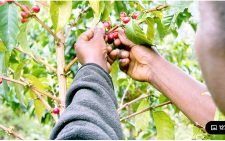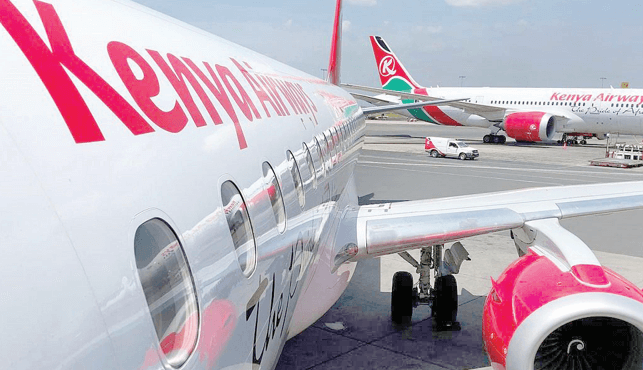Cherry gold rush: Why coffee farming is the in thing again

Farming has long been viewed as a labour-intensive, outdated practice reserved for the older generation, as more people opt for white collar jobs.
However, it stands as one of the most lucrative ventures, particularly in Kenya’s coffee industry. With nearly Sh40 billion paid to farmers in just 16 months through the Direct Settlement System (DSS), the narrative of agriculture must change.
This “cherry gold” is proof that farming isn’t just about getting your hands dirty—it’s about smart business, innovation, and tapping into global markets.
The Nairobi Coffee Exchange (NCE) revealed that since reopening the auction on August 15, 2023, over 56.7 million kilograms of clean coffee have been traded.
This turnover underscores the potential within Kenya’s coffee sector, which is experiencing a revival thanks to digital innovation and strategic reforms in the sector.
NCE’s Chief Executive Officer, Lisper Ndung’u, confirmed that farmers received $241.8 million (Sh37.9 billion) from October 2023 to January 2025, with more than 800,000 bags of clean beans sold.
One might wonder, what makes coffee farming so profitable? Beyond the quality of Kenyan coffee, which is globally recognized for its rich flavor, the introduction of the DSS has revolutionized payment systems.
Previously, farmers faced delays and lacked transparency in payment processes, making coffee farming seem like a risky venture. Now, with the DSS in place, payments are made promptly after sales, ensuring farmers receive their hard-earned income without unnecessary delays.
“Since the system was put in place, farmers have been receiving payments right after coffee sales, with all creditors paid first,” noted Ndung’u.
This level of efficiency and transparency is a game changer, creating an environment where young entrepreneurs can thrive.
The DSS is among symbols of how technology can transform traditional industries. Launched on August 9, 2023, with Cooperative Bank of Kenya as the service provider, the system simplifies transactions, ensuring that all parties in the value chain are paid swiftly.
It operates under the new coffee trading regime, supervised by the Capital Markets Authority (CMA), and follows the 2024 Nairobi Coffee Exchange Limited Trading Rules. This digital approach not only boosts transparency but also builds trust, encouraging more young people to explore coffee farming as a profitable business venture.
For the 2023/24 coffee period alone, farmers earned $189.3 million (Sh31.2 billion), while the first four months of the 2024/25 crop year saw payouts of $52.5 million (Sh6.7 billion).
The question is, why aren’t more young people getting involved? One reason is the perception that farming is “dirty work” meant for the older generation. But with systems, farming has transformed into a tech-driven enterprise.
National Coffee Cooperative Union (NACCU) Chairman, Francis Ngone, emphasized the positive impact of DSS, highlighting its role in solving long-standing payment challenges.
“Currently, the system manages proceeds for more than 400 out of 650 farmers’ cooperative societies in Kenya. We applaud Cooperative Bank for the efficient handling of farmers’ income,” he stated.
One of the key attractions for young entrepreneurs is the speed of payment. Unlike in the past, farmers now receive their proceeds within seven days of a coffee auction.
According to Bahama Muriithi, Chairman of Iria-ini Farmers Cooperative Society in Nyeri County, “The DSS is a game changer in terms of payment. Today, most farmers receive their payment within days as stipulated under trading regulations.” This reliability and efficiency eliminate the financial uncertainties that previously plagued the coffee industry, making it a stable and attractive investment.
Some stakeholders have criticized the DSS, claiming it was poorly established, but most argue that these objections come from individuals with vested interests in the old, opaque system. For the majority of farmers, DSS represents a fair and transparent way of doing business. This shift towards transparency and accountability is exactly what young people need to see to be inspired to join the agricultural sector.
The DSS is also solving challenges related to expenses. Under this system, costs for milling, marketing, and cherry advances are deducted before payments are made to farmers. This means farmers receive a net amount without having to worry about settling debts or other expenses later.
It’s a streamlined, efficient process that allows them to focus on improving productivity and scaling their businesses. For young people accustomed to digital transactions and transparent financial systems, this model is both familiar and appealing.
With over 56.7 million kilograms of clean coffee traded since August 2023, the industry is not only providing income to farmers but also creating jobs in processing, logistics, and retail. By embracing modern agricultural practices and leveraging technology, young entrepreneurs can capitalize on this growing demand and contribute to the nation’s economy.
In addition, the Kenya Kwanza Government’s push for coffee sector reforms, including licensing farmer-led organizations as brokerage firms, empowers local communities to take control of their economic destiny.
With 16 licensed coffee brokers, most of which are county farmers’ cooperative unions, the coffee trade is becoming more inclusive and community-driven. This model provides a blueprint for young people to organize themselves, form cooperatives, and negotiate better prices for their produce.
Kenya’s reputation for high-quality beans also gives Kenya a competitive edge. The DSS has made it easier for local farmers to access international markets, ensuring they get fair prices for their premium coffee. For young entreprenuers looking to venture into exports, this is a golden opportunity to tap into the global value chain.














